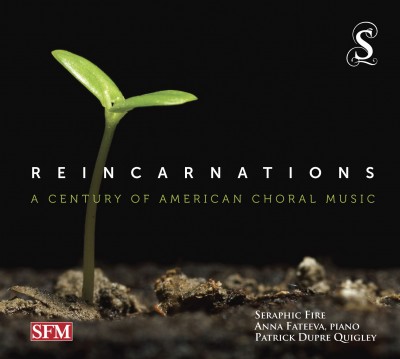
New Seraphic Fire recording celebrates fresh American choral music
Anyone who’s talked to Patrick Dupré Quigley over the years at some point becomes aware that he is a committed advocate for American choral music and choral ensembles.
Quigley’s latest recording with his Miami-based Seraphic Fire concert choir, released Tuesday, is a collection of American music spanning about 120 years, from the anonymous hymns of the Shaker community to new works by contemporary young composers whose scores recorded here are practically still wet with inkjet from their notational printouts.
Reincarnations: A Century of American Choral Music was recorded this past May at Bowers Chapel in Naples, a departure from the usual All Saints Episcopal Church venue in Fort Lauderdale. It does well by the 13 singers, reflecting their blend well and allowing the listener to hear some of the sometimes very complex texts clearly.
The recording features work by 10 composers, nine of them living, and six of them still in their 30s: Shawn Crouch, Dan Forrest, Nico Muhly, Dominick DiOrio, Colin Britt and Jake Runestad, all of whom — Muhly in particular, whose opera Two Boys had its American debut last year at the Metropolitan Opera — represent a strong wave of new American composition that is doing well in concert halls everywhere, not just in the United States. To a man, these pieces are well-crafted, highly imaginative, thoroughly conversant with choral texture, and intensely personal. Their choices of texts, including poets from Robert Louis Stevenson and Edna St. Vincent Millay to William Wordsworth and the Bible (Muhly uses part of Psalm 139), demonstrate a deep sensitivity to literature.
The most immediately accessible of the six pieces is Forrest’s “Good Night, Dear Heart,” set to a poem by the Australian writer Robert Richardson that Mark Twain adapted for the gravestone of his daughter Susy, who died at 24. Forrest’s Requiem for the Living has become something of a choral sensation (Fort Lauderdale’s Nova Singers did it last season) in the past couple years, and “Good Night” has much of the same appeal, notably a strong melodic profile and a sweet harmonic language.
Two older composers, Frank Ticheli, best-known for his band music, and British-born Paul Crabtree, are represented here by “Earth Song” and “Death and Resurrection,” respectively. Ticheli’s straightforwardly lovely piece is about an artist taking refuge from the world’s miseries, while Crabtree’s more recondite but no less beautiful motet blends three disparate texts into a moving meditation on eternity. Its last section in particular has in its three iterations an echo of the great Tudor Catholic composer Thomas Tallis in its soaring lines and sense of endless unfolding.
The record also contains two Shaker hymns, “Give Good Gifts,” from the 1893 Mount Lebanon songbook, and “Followers of the Lamb,” which might be considerably older. These get vivid, vigorous readings that contrast quite starkly with the more learned sophistication of the rest of the music on the disc. The only other music by a non-living composer on the recording is that of Samuel Barber, whose music a staple of concert halls everywhere, and who is one of the very few composers of his generation (1910-1981) to become part of the permanent repertory, primarily for his Violin Concerto and above all, his Adagio for Strings.
Barber wrote a good deal of vocal music (he was a good singer himself, and the nephew of Louise Homer, who was a major opera star at the turn of the last century), including Reincarnations (Op. 16), a setting of three poems by the Irish writer James Stephens. This difficult but rewarding piece is masterful and uncompromising, and Seraphic Fire and Quigley have done a real service by including it on this recording.
The recording ends with a work by the elder statesman of American choral music, 71-year-old Morten Lauridsen, who has taught for more than 40 years at the University of Southern California. His Mid-Winter Songs, a collection of five songs set to texts by the English writer Robert Graves, is a majestic essay in pale light; the overall flavor of these songs is tonal but austere, with a powerful piano part, played expertly here by Anna Fateeva, that adds to the impression.
I’ve only had time to listen to the recording (via iTunes) a couple of times, but it is impressive. The singing is excellent, the readings uniformly good, and it is, as always with this group, a project carried out with the utmost seriousness and integrity. Best of all, this is a document of a living American choral tradition, a tradition with a giant repertoire that is mostly known only to its practitioners, especially in academia.
And while there’s no shame in that, this is music that all Americans can be proud of, and that we should all get to know. Homegrown American classical music has had a low national profile for 200 years (with the possible exception of the years just before and after World War II). But it seems to me that the current crop of young classical musicians is making an excellent case for American performers and composers, and it’s recordings like this one that add some heft to our cultural powers of persuasion.
Recent Content
-
Artsarticle ·
-
Artsarticle ·
-
Artsarticle ·

